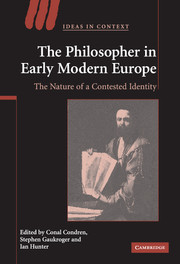Book contents
- Frontmatter
- Contents
- List of contributors
- Acknowledgements
- Introduction
- 1 The persona of the natural philosopher
- 2 The university philosopher in early modern Germany
- 3 The persona of the philosopher and the rhetorics of office in early modern England
- 4 From Sir Thomas More to Robert Burton: the laughing philosopher in the early modern period
- 5 Hobbes, the universities and the history of philosophy
- 6 The judicial persona in historical context: the case of Matthew Hale
- 7 Persona and office: Althusius on the formation of magistrates and councillors
- 8 Descartes as sage: spiritual askesis in Cartesian philosophy
- 9 The natural philosopher and the virtues
- 10 Fictions of a feminine philosophical persona: Christine de Pizan, Margaret Cavendish and philosophia lost
- 11 John Locke and polite philosophy
- Index
- IDEAS IN CONTEXT
1 - The persona of the natural philosopher
Published online by Cambridge University Press: 06 November 2009
- Frontmatter
- Contents
- List of contributors
- Acknowledgements
- Introduction
- 1 The persona of the natural philosopher
- 2 The university philosopher in early modern Germany
- 3 The persona of the philosopher and the rhetorics of office in early modern England
- 4 From Sir Thomas More to Robert Burton: the laughing philosopher in the early modern period
- 5 Hobbes, the universities and the history of philosophy
- 6 The judicial persona in historical context: the case of Matthew Hale
- 7 Persona and office: Althusius on the formation of magistrates and councillors
- 8 Descartes as sage: spiritual askesis in Cartesian philosophy
- 9 The natural philosopher and the virtues
- 10 Fictions of a feminine philosophical persona: Christine de Pizan, Margaret Cavendish and philosophia lost
- 11 John Locke and polite philosophy
- Index
- IDEAS IN CONTEXT
Summary
Philosophers in antiquity and in the early modern era reflected on and probed the nature of philosophical activity, asking what its legitimacy consisted in. But the kinds of answers that they came up with differed in a number of fundamental ways. The contrast for Plato and Aristotle was between the genuine philosopher and the sophist, whereas for early modern philosophers it was often between the secular natural philosopher and the scholastic. In both cases questions of intellectual honesty are paramount, but these are very much more in the foreground in the early modern period. Here they come to centre on the issue of commitment to a system, as charges of intellectual dishonesty are brought against those who argue from the standpoint of a purported systematic understanding. I explore this shift as part of a redefinition of the persona of the natural philosopher.
THE ORIGINS OF THE PHILOSOPHER
The question of what it means to be a philosopher goes back to the origins of the understanding of what philosophy is, which we can trace to Plato and the immediate Platonist tradition. This tradition was not a disinterested one. Its concern was not to discover what had been meant by ‘philosophy’ – the Presocratics had in fact designated what they were doing as historia (enquiry) – but to carve out and shape a particular kind of discourse for its own purposes, providing it with a genealogy and characterising it in a way that marginalises its competitors.
- Type
- Chapter
- Information
- The Philosopher in Early Modern EuropeThe Nature of a Contested Identity, pp. 17 - 34Publisher: Cambridge University PressPrint publication year: 2006
- 7
- Cited by

